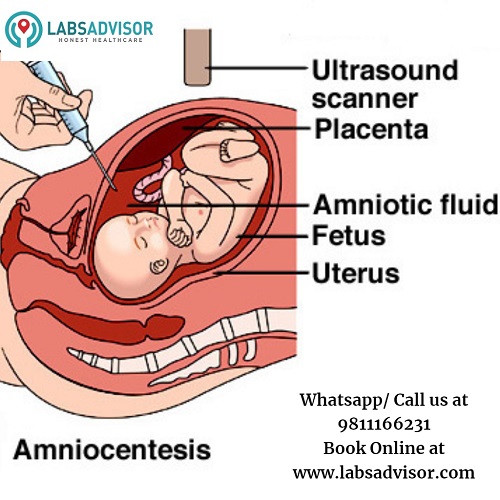Find Pregnancy DNA Test Cost in all the labs, compare prices and book appointment online with up to 60% discount at over 250+ labs in 30+ cities exclusively through LabsAdvisor – “India’s Largest Online Medical Test Platform.” Served more than 10 lakh happy customers across the country.
Or call LabsAdvisor at +918061970525 to know the DNA test during pregnancy cost offered by all the best labs.
Frequently Asked Questions About Pregnancy DNA Test
What is a DNA Test During Pregnancy?
DNA Paternity test uses the matching for DNA from two samples, one from a child and another from alleged or potential father, to conclusively establish the relationship. If the test is positive then the child is the son or daughter of the alleged father. If the result is negative, the child is NOT the son or daughter of the alleged father.
Can I check the paternity of a child before the child is born?
Yes, the DNA technology has become so advanced that it can compare the DNA of an unborn child with the DNA of the alleged/potential father. This test conclusively proves whether the alleged father is the biological father of the unborn child.
What is Prenatal DNA Paternity Test (DNA Test during Pregnancy in India)?
Prenatal DNA paternity test (DNA Test during Pregnancy in India) is conducted when a lady is pregnant. If for some reason the lady is unsure who is the father of the child or the father insists on checking the paternity of the unborn child, this test can help.
The DNA sample of the unborn child is matched with the DNA sample of the alleged father. The DNA matching can conclusively prove whether the male whose sample is compared is the father of the child or not.
What is the difference between invasive and non-invasive prenatal DNA paternity test?
When a pregnant lady decides to go for a DNA paternity test, this distinction between the invasive and non-invasive prenatal tests is very important.
Non-invasive prenatal paternity test takes the DNA of the child from the blood of the mother. Invasive prenatal paternity test takes the DNA of the child from the amniotic fluid, which means that an invasive procedure needs to be done to the unborn child.
This distinction is very important to note.
We recommend the non-invasive prenatal DNA paternity test very strongly over the invasive version. Here are our reasons for this strong suggestion:
- Non-invasive prenatal DNA paternity test derives the DNA of the unborn child from mother’s blood like in any other blood test. Hence, there is no danger to the child. In an invasive prenatal test, on the other hand, a needle is inserted in the womb to take a sample of the amniotic fluid from which the DNA of the child is derived. This can be stressful for the unborn child and the pregnant mother. There is a chance that an abortion may take place.

Invasive and Non-invasive DNA Test.
- There is no need for the pregnant lady to get herself admitted to hospital for the non-invasive test. Hence, the expenses of the hospital and gynecologist can be avoided. Also, the blood sample for the non-invasive test can be collected from your home avoiding the inconvenience of getting admitted to a hospital.
- The non-invasive prenatal paternity DNA test can be done anytime after 8 weeks of pregnancy and the results are given within 10 days of the blood sample collection. In cases, where this test may determine whether the child will be kept or not, non-invasive prenatal paternity DNA test can help you do the family planning. Indian law allows for a fetus to be aborted within the first 3 months of pregnancy. An invasive test can be done only 12 weeks post pregnancy and hence family planning is not possible.
Hence, always go for non-invasive prenatal DNA paternity test over the invasive test
What is the accuracy of testing for a non-invasive prenatal DNA paternity test?
The technology used for a non-invasive prenatal paternity test is very advanced. It can conclusively prove the paternity relationship between the unborn child and the alleged father.
When is the test report available?
Our report is cross-checked at our partner laboratory in Canada. This is done to ensure that you get the right report for this very important test. Once the blood sample is collected, the report is usually ready in the next 10 days.
If your case is more complicated e.g. DNA sample of the alleged father is difficult to extract, then it may take more time. You will be told before the sample collection if there is any potential delay in your case.
What is the test procedure?
We need two DNA samples for matching and checking the father-child relationship for DNA Test during Pregnancy in India. DNA of the child can be extracted from the blood of the mother anytime after 8 weeks of pregnancy.
Hence, mother’s blood sample will need to be collected. The blood sample of the alleged father will also need to be collected. If for any reason, alleged father’s blood sample is not available, we can also extract DNA of the alleged father from other DNA containing samples like hair.

How many months into pregnancy can prenatal DNA paternity test be done?
Prenatal non-invasive DNA Paternity Test is a very advanced DNA test. DNA of the unborn child can be derived from mother’s blood sample anytime after 8 weeks of pregnancy. So any time after 8 weeks into the pregnancy, this test can be done.
Other topics you may be interested in :-








